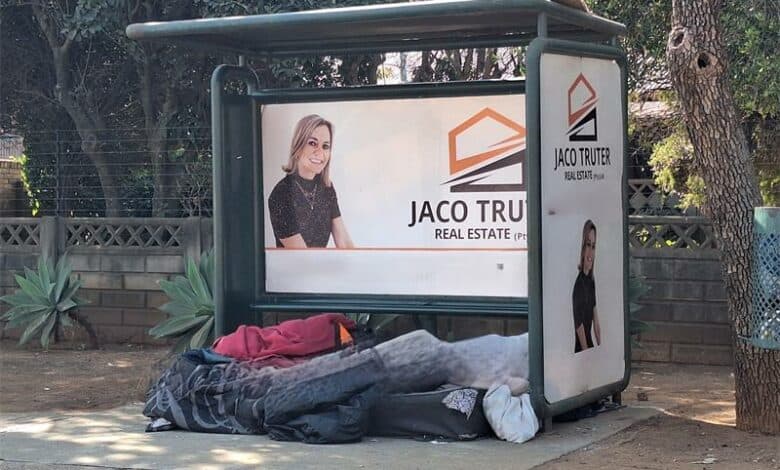News
Residents worried about illegal occupation in established areas

Residents in two suburbs, Waverley in the Moot, and Doornpoort in the north of Pretoria, are at their wits’ end in reporting homeless people living on the streets of their suburbs and putting up informal illegal settlements.
They claim they do not get a reaction from authorities.
For a resident of Waverley, who wants to remain anonymous, this has now come to a head.
Even though they report the illegal occupants of spaces around the Waverley Centre as well as street-based people who sleep in bus shelters such as on the corner of Codonia and Starkey streets during the night, the metro does not heed these calls.
“The homeless people stay in these shelters the whole day and spread their sleeping material in the shelters during the day. This prevents residents from using the shelters when they are waiting on buses. These occupiers of the bus shelters also use the walls around the shelters to relieve themselves and create health hazards such as rat infestations,” said the resident.
He is concerned that Waverley’s central business district will soon be overrun by illegal squatters who are also putting structures up in these areas and using residential properties’ gardens as toilets.
“We report this regularly and nothing is done about the escalating problem of homelessness and illegal settlements in between houses and businesses in the suburbs of Pretoria.
I am not talking of huge informal settlements on the fringe of the city but spots of illegal occupation within stable and established residential areas.
This is about shacks in the suburbs. It is as if there are no policies in place to police this problem or any political will from the authorities,” said the resident.
In Doornpoort it has been a year that residents have been reporting illegal squatters in between houses intermittently to the metro police and other metro departments.
People have been putting down informal accommodation structures on the open field near a franchise selling fried chicken in Doornpoort.
Residents said a sustainable solution needs to be found, as these problems are reported to the metro time and time again.
“Some action has been taken by the metro to remove the illegal squatters, but after a while, the field is just as occupied as before. We need consistency from the metro,” a resident pointed out.
What is worrying these residents is that squatters sleeping in this area are making fires at night next to the walls bordering on properties.
“This is not only illegal but also a fire disaster waiting to happen,” a resident told Rekord.
Metro spokesperson Lindela Mashigo said the issue of squatters as well as the homeless and people living on the streets, is so complicated that it would be a challenge to determine the number of illegal occupants in Tshwane.
“It can be said that the city has serious challenges of illegal occupation. As a result, the city has adopted a framework to deal with the issue of bad buildings which are the main source of illegal occupations. According to the 2022 Census report by Stats SA, there are 10 085 homeless people in the City of Tshwane,” explained Mashigo.
The city in partnership with the University of Pretoria conducted the Tshwane Homeless Count in 2022 to establish the number of homeless people in Tshwane and their challenges.
The key findings were that homelessness is caused mainly by a lack of economic activities such as jobs and business opportunities.
According to Mashigo, the survey showed most of the homeless people on the streets of Tshwane are men. He pointed out that there is however a new emerging trend of women and children also living on the streets of Tshwane.
“Most homeless people and people living on the streets are South Africans and from local townships,” said Mashigo.
He said that as a measure to prevent homelessness in suburbs, such as in Doornpoort and Waverley, once a case of illegal occupation has been reported, social workers can be deployed to establish if they need accommodation at shelters.
“If these illegal occupants are interested, arrangements will be made to relocate them to shelters. If there is no interest from the people, the metro police will need to enforce by-laws,” said Mashigo.
At present the metro makes use of the Street Homelessness policy which was adopted in 2019.
“The policy provides for the establishment of






















